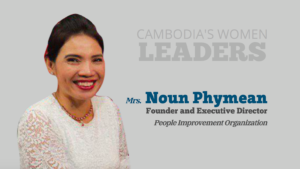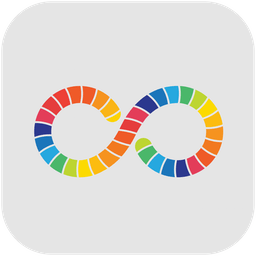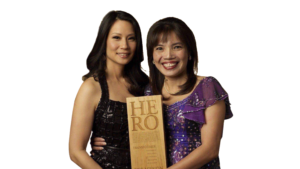
This is a single part of a series of stories of 21 women leaders of Cambodia. Download the full publication here.
Give a short introduction about your life (family, education, marital status) and how has your experience been as a leader and what achievements are you most proud of?
I was four years old when the Khmer Rouge seized power in Cambodia. For four years we were living in the dark with very little food and no access to school. My family and I worked hard in the camps and miraculously all of us survived the regime. After the fall of Khmer Rouge I was finally able to start school. My mother taught me that education was the key to my future and I studied hard to get good grades and was always aiming for the top.
When I was 15, my mother died of cancer. My sister had left her two year-old daughter with my mother so the child became my responsibility. Everyday from there on I had to work very hard to take care of my niece while also putting myself through school. After several years I was recruited to join the United Nations and my life was turned around. My hard work paid off. I became a Finance Manager. Still I wanted to keep learning and continue my education. Later on I was able to get a full scholarship to go to a university in the USA. I now have my family which consists of my husband Steve and my two children Angie and Alex.
My experience as a leader was both challenging and rewarding. My biggest accomplishment is that I opened my school, “People Improvement Organization”, to help over 1500 of the poorest children in Cambodia have a better future.
In recognition of my contribution to children’s welfare, I was bestowed the prestigious CNN award in 2008, and in 2015 I received the World Children Prize Award from the Queen of Sweden.
I have learned that perseverance and passion are key to success.
When you first started out with your career, what were your most significant challenges?
My most significant challenges were financing. When I started my organization, I left my day job as a finance manager for the UN and put all my funds into creating a school for impoverished children. At that time, I was the breadwinner of my family and when I decided to pursue my dream of opening the school it put a strain on our family’s finances. However, I continued working towards what I believed in and I have achieved it.
Over the years, what valuable lessons have you learned as a leader?
I have learned that perseverance and passion are the keys to success. I think that while working with my team, letting my team members voice their thoughts and have creative freedom allows us to have a good team dynamic. It is also imperative to understand that as a leader it is okay to make mistakes and keep moving forward as long as I trust that I made the best possible decision. My belief is that when setting a goal, I must meet it. After all, actions do speak louder than words.
What are your core values and how do you ensure your team is aligned with your values?
My core values are honesty, integrity, respect (to yourself and to others), fairness, always learning and improving, and to work hard. To ensure that my team aligns with my core values , I showcase my values through my actions. I believe that in order for my team to follow my core values they need their team leader to show them how and this way I would be able to ingrain this into my whole organization.
What are some of the behaviors or traits that you think are negatively impacting leadership?
Having a closed mind will not only negatively impact your team, it also impacts yourself, and it does not allow you to grow. In every leadership position it good to keep an open mind to ideas and solutions. Another behavior leaders should avoid is micro-managing; dictating every single action your employees take will put stress both on you and the employees. Instead, you need to be clear on what the goals are and make sure to get relevant updates on the milestones.
What are you doing to continue to excel as a leader (leadership tips in doing business and promoting women’s economic empowerment or gender equality)?
Since the love of learning is one of my character strengths, I constantly seek ways to gain knowledge and continue to excel as a leader. Positive relationships are a key part of this. I have a large international network and have many trusted people around the globe to whom I can turn for advice. I always do everything I can to help people without expecting anything in return and I think that people can sense that and are willing to support me because they know I am being honest and genuine.
If I would give advice to young women who are looking to excel as leaders I would say that they should learn from others with more experience but always be aware that people will give advice based on their own values. I want to encourage young women to be true to themselves and follow their own path.
What are some of the biggest risks you’ve taken in your career and how did they turn out?
To leave a well-paid job to go out and build a school on a garbage dumpsite was a very risky endeavour. I saw that children were suffering and that they did not attend school. It reminded me about my own childhood when Khmer Rouge had closed all the schools. The first day, 25 children came. Today we serve 1,300 children and I have gained international recognition for my work. This was a risk I never hesitated to take because I knew in my heart that it was the right thing to do. Because I acted to protect what I truly value, all those children will have a better future.
What makes Cambodian culture unique and how do you think Cambodia can thrive in this age of entrepreneurship & dynamic leadership.
Cambodia is a growing country with a young population. We continuously want new innovative solutions and products. With the introduction to other countries’ technology, I believe many young people will be inspired to become entrepreneurs. We are a country filled with talent and will soon catch up with the rest of the world with innovations and in entrepreneurship.
Cambodian culture is also a culture where people are focused on gratitude and how we can make the most of what is given to us. A Swedish friend of mine is currently studying what impact gratitude has on entrepreneurship and she has found Cambodia to be a good example of a country where young people leverage the power of gratitude to be more entrepreneurial.
What advice do you have for young Cambodian female entrepreneurs?
My advice is to have a dream and no matter what, keep working towards that dream. If you fail, keep getting back up and try. Dreams are not achieved in one day and you learn from your failures.
© Copyright 2019
This is a joint publication by Woomentum and Konrad Adenauer Stiftung. Download the full publication here.

